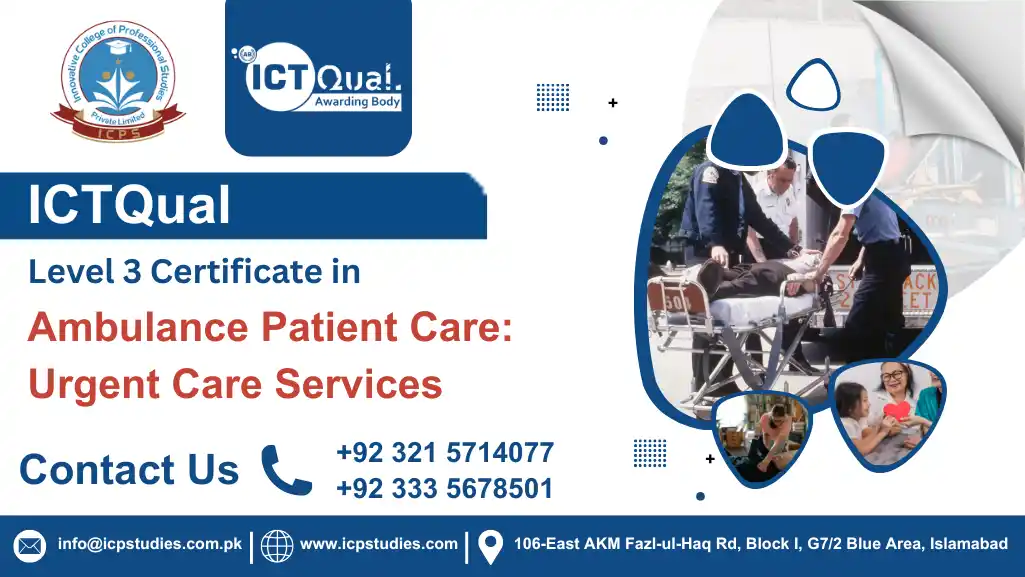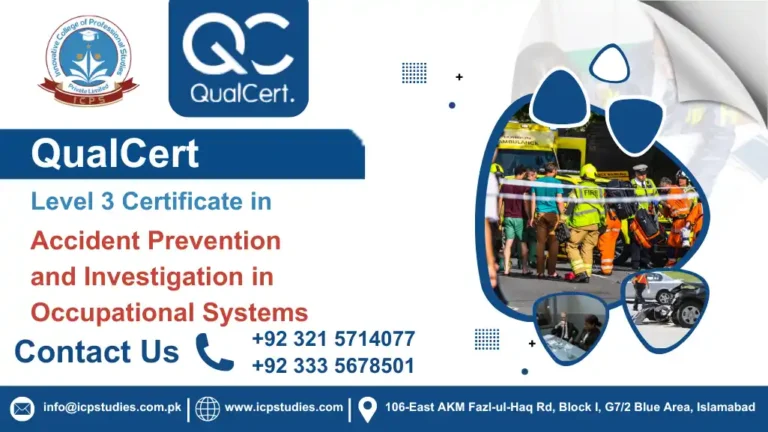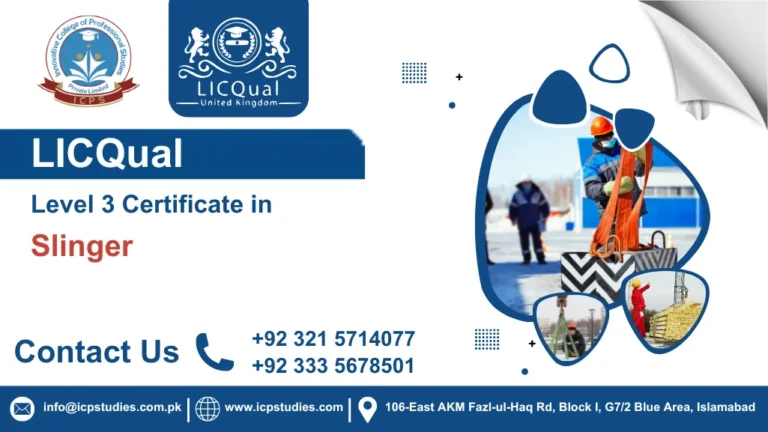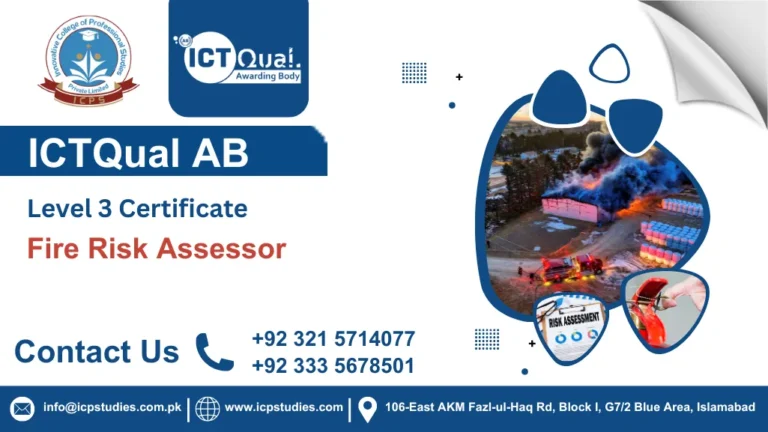The ICTQual Level 3 Certificate in Ambulance Patient Care: Urgent Care Services is a professionally developed qualification aimed at equipping learners with the knowledge and practical skills required to deliver effective pre-hospital urgent care. As demand for responsive and skilled emergency medical services continues to rise, this certification provides a strong foundation for individuals working in ambulance care or those aspiring to support patients in urgent medical situations. The qualification emphasises real-world application, with training tailored to scenarios encountered by ambulance personnel and urgent care support staff. It is particularly suitable for individuals who are looking to gain a structured and recognised qualification in urgent care support.
This ICTQual Level 3 Certificate in Ambulance Patient Care: Urgent Care Services focuses on delivering safe and effective care during urgent but non-life-threatening emergencies. The curriculum includes core areas such as patient assessment, minor injury management, vital sign monitoring, emergency response communication, and legal responsibilities in patient care. By bridging theory with hands-on skills, the course prepares learners to work confidently in unpredictable and high-pressure environments while adhering to the highest standards of patient care and professional conduct. This qualification aligns with industry best practices and supports the development of competent practitioners capable of providing safe, ethical, and person-centred care in diverse pre-hospital environments.
The ICTQual Level 3 Certificate in Ambulance Patient Care: Urgent Care Services offers learners a blend of theoretical understanding and practical skills, tailored to meet the demands of urgent pre-hospital care. Delivered to meet UK and international standards, this course provides valuable career development for professionals working in or entering the field of emergency healthcare. The ICTQual Level 3 Certificate in Ambulance Patient Care: Urgent Care Services also supports organisations in building competent and compliant medical teams, capable of delivering high-quality patient care during urgent medical situations. Its flexibility makes it suitable for both full-time professionals and those studying part-time alongside existing work commitments.
All About ICTQual Level 3 Certificate in Ambulance Patient Care: Urgent Care Services
Course Overview
The ICTQual Level 3 Certificate in Ambulance Patient Care: Urgent Care Services is designed to equip learners with the essential skills and knowledge needed to deliver high-quality, responsive care in urgent medical situations. This qualification focuses on non-emergency but time-sensitive scenarios, where prompt decision-making and effective patient handling are critical. It prepares learners to work confidently in dynamic healthcare environments, supporting both patients and clinical teams.
This ICTQual Level 3 Certificate in Ambulance Patient Care: Urgent Care Services covers vital areas such as patient assessment, communication, infection control, minor injury management, and safe patient transportation. It integrates theoretical instruction with practical application, ensuring learners can apply their knowledge in real-world situations commonly faced by ambulance care professionals.
This ICTQual Level 3 Certificate in Ambulance Patient Care: Urgent Care Services is Ideal for those working or aspiring to work in ambulance services, community healthcare, or urgent response teams, the qualification meets UK standards and aligns with current healthcare practices. It provides a pathway for further study and career advancement in pre-hospital and emergency care sectors.
With growing demand for skilled urgent care responders, this ICTQual Level 3 Certificate in Ambulance Patient Care: Urgent Care Services offers the competence, confidence, and recognition needed to support public health and emergency medical services across various care settings.
Study Units
- Foundations of Emergency Medical Services (EMS)
- Patient Assessment and Triage
- Medical Emergencies
- Trauma Management
- Pharmacology and Medication Administration
- Special Patient Populations
- Technological Innovations in EMS
To ensure learners are prepared to successfully engage with the course content and demonstrate competence in urgent care environments, the following entry requirements apply:
Minimum Age
Learners must be at least 18 years of age at the time of enrolment.
Educational Background
A minimum of a secondary school qualification (e.g., GCSEs or equivalent) is required. A background in health, social care, or a related field is beneficial but not essential.
Work Experience
While prior experience in healthcare, ambulance support, or emergency services is advantageous, it is not mandatory. This course is suitable for both entry-level learners and individuals seeking formal recognition of existing skills.
Language Proficiency
As the course is delivered in English, learners must have a good command of written and spoken English. Non-native speakers may be asked to provide proof of language proficiency through a recognised qualification such as IELTS or an equivalent assessment.
This ICTQual Level 3 Certificate in Ambulance Patient Care: Urgent Care Services is designed for individuals who are either currently working in or planning to enter the field of pre-hospital and urgent care services. It is particularly suitable for those seeking to enhance their skills, formalise existing experience, or progress within the healthcare and emergency response sector.
This course is ideal for:
- Ambulance support workers and emergency care assistants
- Health and social care professionals involved in patient transport or community healthcare
- First responders, volunteers, and staff in urgent care or clinical support roles
- Individuals seeking a career in ambulance services or emergency medical response
- Learners progressing from Level 2 health or care qualifications looking to specialise in urgent care
- Organisations aiming to upskill employees involved in frontline patient care
The course caters to a broad range of learners, from new entrants to experienced staff, and supports career growth through recognised, skill-based training aligned with UK healthcare standards.
Learning Outcomes
Foundations of Emergency Medical Services (EMS)
- Understand the structure, roles, and responsibilities within modern EMS systems
- Recognise the importance of teamwork, communication, and ethical practice in emergency care
- Describe the scope of urgent care within pre-hospital medical services
Patient Assessment and Triage
- Perform structured primary and secondary patient assessments
- Apply triage principles to prioritise care in urgent and multiple-casualty situations
- Interpret vital signs and clinical indicators to inform urgent care decisions
Medical Emergencies
- Identify common medical emergencies and their symptoms
- Respond appropriately to conditions such as respiratory distress, cardiac events, and diabetic episodes
- Provide stabilisation and pre-hospital intervention in non-trauma cases
Trauma Management
- Assess and manage patients with traumatic injuries, including bleeding, fractures, and spinal concerns
- Use appropriate techniques for immobilisation and wound care
- Understand the principles of trauma care in pre-hospital environments
Pharmacology and Medication Administration
- Understand the principles of pharmacology in urgent care settings
- Safely prepare, administer, and document medications within your scope of practice
- Recognise potential adverse reactions and respond accordingly
Special Patient Populations
- Adapt assessment and care for paediatric, geriatric, and vulnerable adult patients
- Recognise unique medical needs and communication strategies for diverse populations
- Provide respectful, inclusive, and tailored urgent care
Technological Innovations in EMS
- Identify current technologies used in pre-hospital emergency care (e.g., defibrillators, patient monitors)
- Understand how digital tools and mobile systems support clinical decision-making
- Integrate technology effectively to enhance patient outcomes in urgent care scenarios
FAQs ICTQual Level 3 Certificate in Ambulance Patient Care: Urgent Care Services







